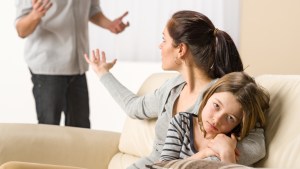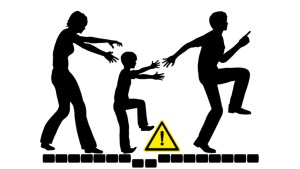“I don’t remember being very free regarding how my parents raised me,” sighs 35-year-old Leslie. Like many parents, she tries to avoid repeating the mistakes she suffered as a child, yet ultimately fails. Her mother would often forget to pick her up from school, and now she overprotects her son. As a result, he is afraid of everything and doesn’t want to try anything new. “I feel like I’m stuck between a rock and a hard place!” says the young woman.
Then there’s John who, having suffered a lot from the conflicts between his own brothers and sisters, repeats over and over to his children, “No arguing!,” which only serves to increase their arguments tenfold.
By focusing excessively on the faults of child rearing that they want to avoid, these parents end up creating the opposite effect and inevitably fall into a dynamic that echoes their own childhood wounds.
In her educational textbook, Parents Under the Influence, novelist Cécile David-Weill takes up the subject. While she points out the pitfalls of situating ourselves in opposition to how we were raised, she also points out the dangers of blind reproduction. In both cases, the parent continues to have as sole reference the way their own parents raised them, instead of focusing on the real needs of the child.
According to the author, extricating yourself from an indiscriminate reproduction of how your parents raised you is only possible by analyzing your relationship to it. She therefore encourages everyone to undergo “a dialysis of how they were raised” — in the sense of filtering out the harmful influences and preserving the healthful ones. Everyone can identify the parental behaviors that made them suffer and that they would like to avoid with their own children, but you should also identify those that have helped you grow up. Analyzing the positive and negative points of how you were raised and those that you wish to avoid or pass on allows you to separate the good from the bad in order to make a constructive synthesis. For example, rigorous parents were also able to transmit a great sense of fairness. It is therefore not a question of totally rejecting how you were raised, which is never entirely good or entirely bad—a thesis confirmed by psychologist Marie Pascal: “It is a question of symbolically settling accounts with the education you received from your parents. Between “’Honor your father and your mother’ and ‘Man will leave his father and his mother,’ there is quite an amount of leeway,” she specifies.
Freeing yourself from childhood wounds and choosing your child rearing priorities
Reflection is especially necessary when you have a grudge against your parents. Recurring criticism of the way your parents raised you begs the question of forgiveness and the example you set for your children for how they, in turn, will be parents. “It is a question of substance, of faith, and of life coherence. Didn’t Mother Teresa say: “If you want peace in the world, go make peace in your family”? asks Pascal.
Fr. Xavier Cormary specifies how the sequence of forgiveness can free one from resentment and guilt. “A deep relationship with God allows you to receive his forgiveness, to then be able to forgive yourself, before forgiving your parents, to finally be able to ask for forgiveness with simplicity from your children.” This hindsight and forgiveness can help us to mourn the ideal parents we wish we’d had.

Read more:
What to do when you and your spouse have different parenting styles
We can define our idea of what we think the role of parent should be: is the child, as Montaigne suggests, “a vase that we fill or a fire that we light”? Is a child a soul entrusted to us or a being to be disciplined as we see fit? Inflexible parents run the risk of demanding children who are beyond reproach. To remain effective, it is essential to choose your battles well, especially for adolescents. This is an important point for Cécile David-Weill, who believes that too many parents “overuse their authority on secondary subjects such as bedtime, food, or arguments between siblings, which polarizes the exchanges between parents and child around these rules, instead of allowing them to have a meaningful debate.” Therefore, identifying the non-negotiable points of the family, and those that allow for more flexibility is an important point to keep in mind.
Talk as a couple and trust each other
In this “dialysis,” consulting with your spouse is essential. A spouse has both the distance and the proximity necessary to point out the dysfunctions of their in-laws. Leslie’s husband made her think about the link between her father, who had abandoned her, and a sentence she repeated over and over to their son: “You can’t trust anyone.” For their part, the spouse has also been raised in a way that may contrast with or support the way they intend to rear their children. The dialogue between the parents never really stops, because, according to Marie Pascal, “the key stakes of raising your childbecome clear only as the child grows.” She advises single parents to send their children to get to know other “guardians” such as well-meaning friends, scout leaders, family or spiritual referents who can sometimes compensate for an absent parent or one who has passed away.
Cécile David-Weill remains very strict with parents who are overly obsessed with the idea of parenting badly. Not wanting to repeat mistakes or make new ones—often themselves victims of an overly authoritarian upbringing—they have given up educating. They refuse to fully assume their responsibility and often hide behind total confidence in their child. This attitude can lead the child to manifest “emotional emptiness, a thirst for recognition, fragility in human relations, a lack of self-confidence,aggressive behavior,permanent anxiety, etc.,” specifies the novelist.
Admittedly, parents are not “experts” in raising children, but they must trust each other. And for good reason, “marriage consecrates the couple to education,” as Pope John Paul II reminds us in Familiaris consortio. Father David Lamballe observes: “In marriage, parents have been enriched by the grace of the Holy Spirit to guide their children in their growth as humans and Christians. Parents can be at fault, have a bad relationship with a child, and make mistakes, yet God chose them as the ones to raise that child: He does not do things at random!” These words can help parents who do not feel up to the task. “You don’t have to be a perfect parent to be a good educator,” confirms Cécile David-Weill. It’s a fantasy fabricated by a society that tries to erase our weaknesses and pushes us to hide our defects.
Make sure that you are neither denying yourself nor imposing omnipotence.
Some parents think that they will raise their children better than they were raised, while others,conscious of being marked by the original sin that is repeated from generation to generation, remain fatalistic, convinced of the contrary. “In the Bible, Jeremiah states that ‘The parents have eaten sour grapes, but their children’s mouths pucker at the taste’ (Jeremiah 31:29),” states Fr. Xavier Cormary. However, he immediately adds that this passage invites us to true freedom, since the path is open for parents to make a personal choice to free themselves from the wounds they received in the family. Voluntary reliance on Christ does not, in fact, place us under an external influence that would keep us from thinking for ourselves. Indeed, according to Fr. Cormary, “Christ, an expert in humanity, wants mankind to be happy. Paradoxically, therefore, he calls us to freedom”— a freedom that is rooted in our inner self, as explained in the extensive Gaudium et spes: “In the depths of his conscience, man detects a law which he does not impose upon himself, but which holds him to obedience … For man has in his heart a law written by God.” There is, therefore, no pre-determined fatality.
Regardless of how they were raised, parents must be careful to be neither in a state of oblivion, as was too much the case with the “60s generation,” nor in a state of omnipotence. Rather, it is a matter of taking a path of humility by accepting their child-rearing weak points. A primary mistake of parents is to think that it is their responsibility to instill happiness and confidence in their child,” writes Cécile David-Weill “when, in fact, their job is limited to trying to create the conditions for their children to acquire this on their own.” Doesn’t educating etymologically mean “leading out,” and not appropriating one’s children? “We parents are merely a channel of transmission for the Father’s love,” adds Leslie, who was encouraged by a psychologist that pointed out to her that children always construct themselves through the parents they have.
By converting themselves, the parents open the path for their descendants
There is no ready-made way to raise children, written out in advance, no miraculous educational recipe. Each parent, conditioned but not determined by how they were raised, will do the best they can with what they have received, for children with unique needs. The pitfalls are sometimes sown by their own spouse and by society, who do not always share the same priorities! Raising a child is still the fruit of “a triple conjunction between the Gospel, which can make us more human, the teaching of the Church, and human common sense enlightened by the Holy Spirit,” analyzes Father Cormary.
By converting themselves, parents will open the path for their descendants. Father Luc de Bellescize explains to the young people of the EVEN group: “Something and someone will always be missing on this earth.” Parents as well, will always be missing someone! Paradoxically, to be a parent is to accept oneself as a child of the Father … the same Father as that of one’s children. It is by offering themselves to Him, by letting themselves be loved by Him with all their wounds and human limitations, that spouses will be able to renounce their temptation to be ‘overbearing’ or “underbearing” educators. As they themselves draw nearer to Christ, equipped with this new outlook, they will, in turn, be able to teach their children to depend not on themselves, but on the Father.
Olivia de Fournas

Read more:
12 Hilarious parenting memes that ring true for all moms and dads

